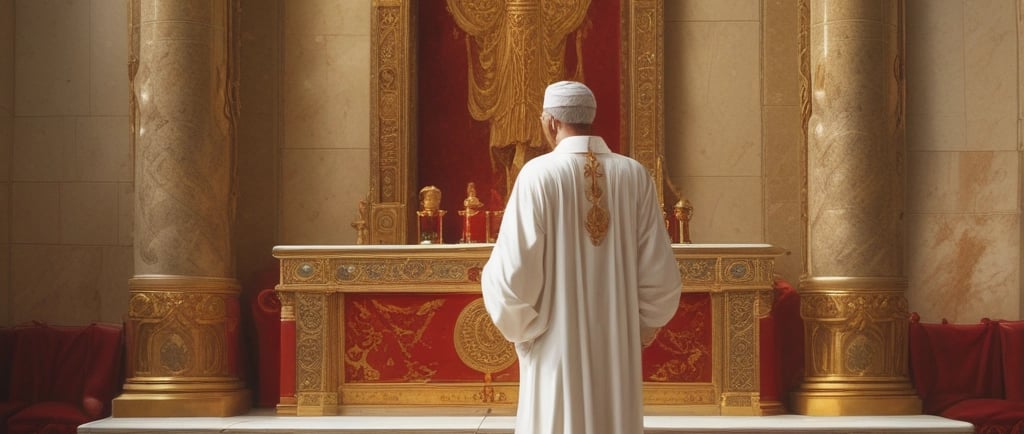Propitiation and the Withholding of God’s Wrath
From the book: The Cosmic Pause — Propitiation and the Withholding of God’s Wrath
THEOLOGY, SOTERIOLOGYPROPITIATION
David M Turner
5/19/20253 min read


Propitiation and the Withholding of God’s Wrath
From the book: The Cosmic Pause — Propitiation and the Withholding of God’s Wrath
Chapter Summary
This chapter explores the meaning of hilastērion in Romans 3:25, its Old Testament context in the mercy seat of the tabernacle, and how the cross becomes the center of divine justice and delayed wrath. The discussion highlights God’s righteousness, His forbearance, and the implications for a cosmos awaiting final judgment.
The Mercy Seat and the Cosmic Delay
In an old village in Europe, a town clocktower had stopped ticking. The villagers could still go about their daily lives, but the looming silence reminded them time had halted. What they didn’t know was that the gears inside were straining against an eventual release. The clock would one day resume—and all would be held accountable for the time lost.
The Apostle Paul, in Romans 3:25, speaks of a far weightier delay. He describes a moment in redemptive history when the judgment of God—like a cosmic timepiece—was paused. The reason: propitiation.
"Whom God put forward as a propitiation by His blood, to be received by faith. This was to show God's righteousness, because in His divine forbearance He had passed over former sins." (Rom. 3:25, ESV)
1. Hilastērion: More Than a Word
The Greek term Paul uses—hilastērion—demands attention. It is not a generic term for appeasement. In the Septuagint, hilastērion is used specifically for the mercy seat (cf. Exod. 25:17–22), the gold cover over the ark of the covenant. This was the sacred place where blood was sprinkled on the Day of Atonement (Lev. 16), symbolizing satisfaction for sin and the reconciliation of God with His people.
As Douglas Moo comments in his commentary on Romans:
“Paul’s use of hilastērion evokes both the idea of propitiation—averting wrath—and expiation—removing guilt—but with direct reference to the mercy seat where God's justice and mercy met.”¹
Paul is not just importing Levitical language. He is pointing to Christ as the new mercy seat—the place where God meets humanity in blood, holiness, and mercy.
2. Atonement in the Shadow of Leviticus
On Yom Kippur, the high priest would enter the Holy of Holies, bearing the blood of a spotless goat. The blood was applied to the mercy seat (hilastērion) as a symbol of atonement. This act did not truly remove sin (Heb. 10:4) but temporarily satisfied God’s covenantal requirements.
What Paul is arguing in Romans 3 is revolutionary: the mercy seat is no longer a place—it is a person.
As Thomas Schreiner writes:
“Jesus is not merely the one who brings the offering; He is the place of atonement, the fulfillment of what the mercy seat represented.”²
This is where the wrath of God is both revealed and restrained—revealed in that sin was so serious it required blood, and restrained in that Christ’s death absorbs what sinners deserved.
3. The Withholding of Wrath
Paul makes a striking point: this propitiation "was to demonstrate His righteousness, because in His forbearance, He had passed over sins previously committed."
This is not indifference. It is delay.
From Adam to Christ, God had not executed full judgment. Cain was spared. Israel grumbled and lived. David committed murder and adultery and still wore the crown. The question arises: Was God truly just?
God's righteousness seemed in tension with His mercy. But in the cross, justice and mercy kiss (Ps. 85:10). The wrath stored up was poured out, not on humanity, but on Christ—the willing substitute.
4. Cosmic Implications
This “passing over” is not merely personal—it is cosmic. Romans 8 reveals that all of creation groans, awaiting redemption. Why the wait? Because the wrath that creation deserves (Rom. 8:20) has been postponed due to the cross. The universe exists in a divinely ordained suspension—God’s wrath has not yet been fully unleashed.
And so, we live in what might be called the “Cosmic Pause.”
The mercy shown at the cross is the very reason the world is not consumed today. Peter echoes this:
"The Lord is not slow… but is patient… not wishing that any should perish." (2 Peter 3:9)
But this patience is not endless. The same cross that offers shelter now will stand as a witness against those who reject it later.
5. Application and Awe
What does this mean for us?
- We live in mercy’s shadow. Every moment is a gift of divine patience.
- We preach a wrath-absorbing gospel. The cross is not a sentiment but a substitution.
- We warn with urgency. The clock will resume. Judgment is not forever postponed.
R.C. Sproul once said, “Sin is cosmic treason.” If that is true, then the cross is cosmic clemency. But clemency, like time, will not last forever.
Footnotes
1. Moo, Douglas J. The Epistle to the Romans. NICNT. Grand Rapids: Eerdmans, 1996, 232.
2. Schreiner, Thomas R. Romans. BECNT. Grand Rapids: Baker Academic, 1998, 190.
Study Questions
1. What is the significance of the term hilastērion and how does it relate to Leviticus 16?
2. How does the cross resolve the tension between God’s justice and mercy?
3. What does it mean that God “passed over” former sins?
4. How should the idea of “delayed wrath” affect our evangelism and our understanding of current events?